A Potpourri of Vestiges Review
By Murtaza Ali Khan (@apotofvestiges) Featured in IMDb Critic Reviews
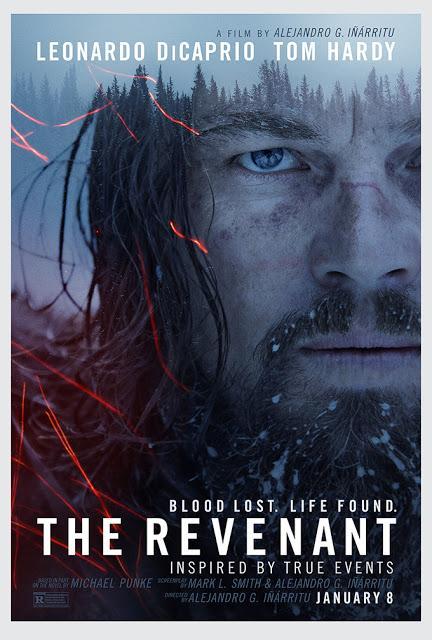
The Revenant (2015) -By Alejandro G. Iñárritu
Our Rating: 9.0 IMDb Ratings: 8.2 Genre: Adventure | Drama | ThrillerCast: Leonardo DiCaprio, Tom Hardy, Domhnall Gleeson Country: USA
Language: English | Pawnee | French Runtime: 156 min Color: Color
Summary: A frontiersman on a fur trading expedition in the 1820s fights for survival after being mauled by a bear and left for dead by members of his own hunting team.
The Revenant is a 2015 adventure thriller film directed by Oscar-winning Mexican filmmaker Alejandro González Iñárritu. Co-written by Mark L. Smith and Iñárritu himself, The Revenant is based on the American author Michael Punke's 2002 novel of the same name inspired by the experiences of the legendary American fur trapper and explorer Hugh Glass whose own men left him for dead after he was mauled by a grizzly bear circa 1820. The movie stars Leonardo DiCaprio, Tom Hardy, Domhnall Gleeson and Will Poulter in major roles. Out of the 12 nominations (maximum for any film this year) that The Revenant received at the 88th Academy Awards, it won in three categories i.e. Best Director for Iñárritu (his second consecutive award in the category following his win last year for Birdman), Best Actor for DiCaprio (his first win), and Best Cinematography for Emmanuel Lubezki (his third consecutive win in the category to follow up Birdman and Gravity). The Revenant is also a winner of three Golden Globe and five BAFTA Awards.
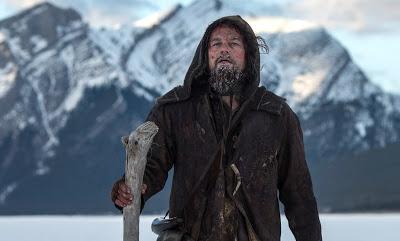
Leonardo DiCaprio as American explorer Hugh Glass in The Revenant
Watching The Revenant on the big screen is an experience in itself and one is bound to be impressed by at least three aspects of the movie, if not more. One, Emmanuel Lubezki's breathtaking cinematography. One just can't help but be in awe of his art. His images transport us back in time as we become an integral part of Glass’ existential journey, marked by spiritual undertones, through the treacherous North American wilderness of the 1820s. The shots, long and deliberate, are so full of life that they make us feel as if the events are unfolding right in front of our eyes.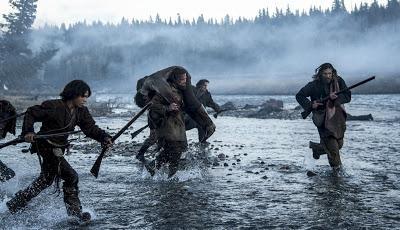
Emmanuel Lubezki's breathtaking cinematography in The Revenant
Second, the acting performances of Leonardo DiCaprio and Tom Hardy and in that order. The win has come for DiCaprio after a long wait and is richly deserved. No justification can prove otherwise given the competition on offer. Among other things, it is the intensity and the extent to which he pushes himself for the sake of realism that make his performance extraordinary. During the last two decades, DiCaprio had done everything in his power to convince the Academy of his worth as an actor but the elusive victory continued to elude him despite delivering some remarkable and diverse performances in films like What's Eating Gilbert Grape, The Aviator, Blood Diamond, The Wolf of Wall Street, The Great Gatsby, Django Unchained, Romeo + Juliet, Basketball Diaries,The Departed, Catch Me If You Can, Titanic and various other films. After so many near misses, DiCaprio must have realized that given his superstar status it will take something special to get the Academy’s nod. And perhaps that’s what would have convinced him to take up a daunting assignment like The Revenant. Yes, he must have had some idea about the impending challenges. But even he wouldn’t have guessed that during the shooting he would have to withstand regular bouts of viral infections, threats of frostbites and hypothermia (with mercury dipping to as low as 40 below zero), or something as gross as eating raw lever despite being a vegan. Perhaps, it can be said that DiCaprio’s portrayal of Glass proved almost as grueling as Glass’ own struggle for survival. The performance reminds one of Tom Hank's in Cast Away. Given DiCaprio gets to speak very little dialogue, and mostly in Pawnee, the part actually qualifies as non-English which puts DiCaprio in a very selective list of Oscar winners. It is one of those rare acting performances that rely so heavily on non-verbal aspects of communication (his eyes and facial expressions tell us everything) and so little on verbal articulation.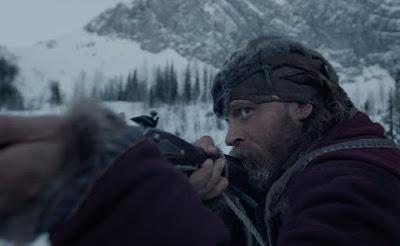
Tom Hardy as John Fitzgerald in The Revenant
As for Hardy, he too deserved an Oscar for his portrayal of John Fitzgerald but the Academy never really fails to disappoint. Playing the part of a mangy mongrel, Hardy adds spark to the movie. And, of course, he gets to speak the best dialogues. Consider this climactic exchange between Glass and Fitzgerald:Hugh Glass: You killed my boy.
John Fitzgerald: Or maybe you shoulda raised a man... instead of some girly little bitch.Hugh Glass: I ain't afraid to die anymore. I'd done it already.
John Fitzgerald: You came all this way just for your revenge, huh? You enjoy it, Glass, 'cuz ain't nothing gonna bring your boy back. As John Fitzgerald, Hardy epitomizes the dark side of human nature. Fitzgerald is shifty but resourceful, cowardly but clever, fickle but determined in his quest for survival. The final showdown between Glass and Fitzgerald not only makes for a great climax but also serves as a perfect closure to their bitter rivalry.
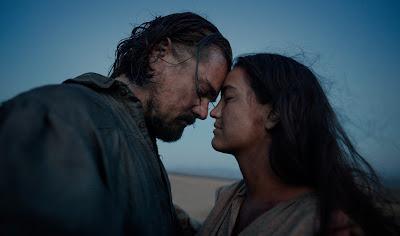
Hugh Glass with his Pawnee wife
Third, Inarritu's cinematic vision, of course. The Revenant may be far from being deemed a great film (that's for the time to decide), but it is nothing short of a bold statement which will inspire other leading filmmakers to push their boundaries. Iñárritu's creative designs seem greatly influenced by Andrei Tarkovksy and Terrence Malick. While the use of voiceovers reminds one of Malick, Iñárritu's admiration for Tarkovksy is evident during a levitation sequence that harks back to The Mirror. Iñárritu, who became the first non-white director and only the third overall to win back to back Oscars after Joseph L. Mankiewicz and John Ford, follows an interesting approach to critically examine racism prevalent in the early 19th century America. His protagonist is a man who is above racism and even sires a son named Hawk with a Pawnee wife (the father-offspring relationship always take the center-stage in films of Iñárritu and The Revenant is no exception). Glass loves his son dearly and tries his best to protect him but his men see Hawk as a half-breed. Some of them, particularly John Fitzgerald, look down upon Glass for siring a half-native son. Fitzgerald may have his own reasons for hating the natives. Perhaps, it is because of his past encounter with the natives during which he was partially scalped. But the deep-seated hostility between the white men and the natives is quite evident throughout the film. What’s interesting to note is that Glass is able to survive despite great adversities as he establishes an alliance with the nature. He has learnt the ways of the natives which other white men aren’t well versed with. So they perish one by one while Glass endures. During his Oscar acceptance speech, Iñárritu emphasized upon the need to ignore questions of color and ethnicity in giving opportunities even as the show producers unceremoniously tried to cut him off before he had used all his time.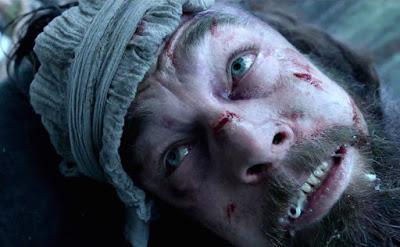
Hugh Glass after being mauled by a grizzly bear
Overall, The Revenant makes for a powerful film viewing experience that simultaneously entertains and makes us think. The film is actually more about survival than it is about revenge and that's where most people seem to have got it wrong. The uninitiated may like to describe it as a case of man versus wild but keen-eyed viewers will certainly perceive it as a treatise on man's symbiotic relationship with Mother Nature. In the words of Leonardo DiCaprio: “Making ‘The Revenant' was about man's relationship to the natural world.” The film is also about the indomitable spirit of man—a recurring theme in American literature. The slow pace of the movie may pose a challenge to the casual viewers but those with patience will be thoroughly rewarded. The viewers are encouraged to watch the forty-four minute documentary, namedA World Unseen, about the making of The Revenant available on YouTube. The only way to watch The Revenant is on the big screen or else you would be doing a great injustice to yourself. Highly recommended!Readers, please feel free to share your views/opinions in the comment box below. As always your insightful comments are highly appreciated!
References:
IMDb
Wikipedia The Revenant (2015) Movie Trailer
Previous Post: Oscar 2016: Complete List of Winners
Next Post: The Truman Show (1998)
Complete List of Reviews Share on Facebook Share on Twitter Share on Google Plus
